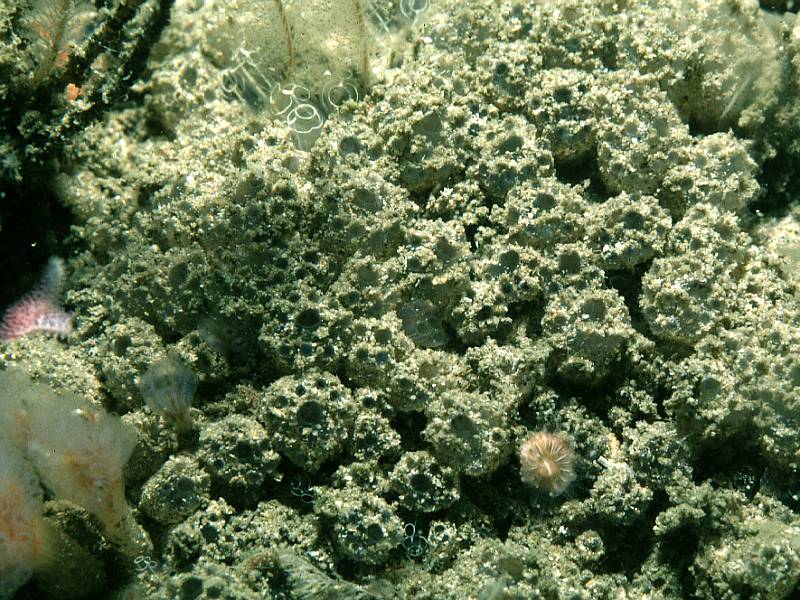| TUNICATA : Aplousobranchia : Polyclinidae | SEA SQUIRTS |
Synoicum incrustatum (M Sars, 1851)
 |
| Synoicum incrustatum |
Description: Individual colonies consist of a flat topped globular mass with a common central exhalant siphon and peripheral inhalant openings. They are usually clustered tightly together covering areas of rock 6-10cm across. The heads are heavily encrusted with sand, both on their sides and upper surface, this sand being incorporated into the surface of the test. The zooids themselves are colourless, and the overall colour is grey or grey-brown. Each head about 6-10mm in diameter.
Habitat: A common species on vertical rock faces in exposed places where it occurs with a number of other ascidians, especially polyclinids. Shows a definite preference for areas with strong tidal streams and a certain amount of sand scour.
Distribution: Western coasts of the British Isles at least as far north as N. Ireland. There are apparently no Scottish records at present.
Similar Species: Probably extensively mistaken for other species especially Polyclinum aurantium in the British Isles as this species was omitted from Millar.
Key Identification Features:
- Small, squat, flat topped heads, with single, central exhalant opening.
- Sand encrusting entire test.
- Globular form with short basal stalk.
- Internal anatomy.
Distribution Map from NBN: Synoicum incrustatum at National Biodiversity Network mapping facility, data for UK.
iNaturalist: Synoicum incrustatum at iNaturalist World Species Observations database.
GBIF data for Synoicum incrustatum
WoRMS: Synoicum incrustatum at World Register of Marine Species. Accepted name: Synoicum incrustatum (Sars, 1851). AphiaID: 103689.
Classification: Biota; Animalia; Chordata; Tunicata; Ascidiacea; Aplousobranchia; Polyclinidae; Synoicum
| Previous species | Next species |
| Picton, B.E. & Morrow, C.C. (2024). Synoicum incrustatum. (M Sars, 1851). [In] Encyclopedia of Marine Life of Britain and Ireland. https://www2.habitas.org.uk/marbiop-ni/speciesaccounts.php?item=ZD400. Accessed on 2025-04-09 |